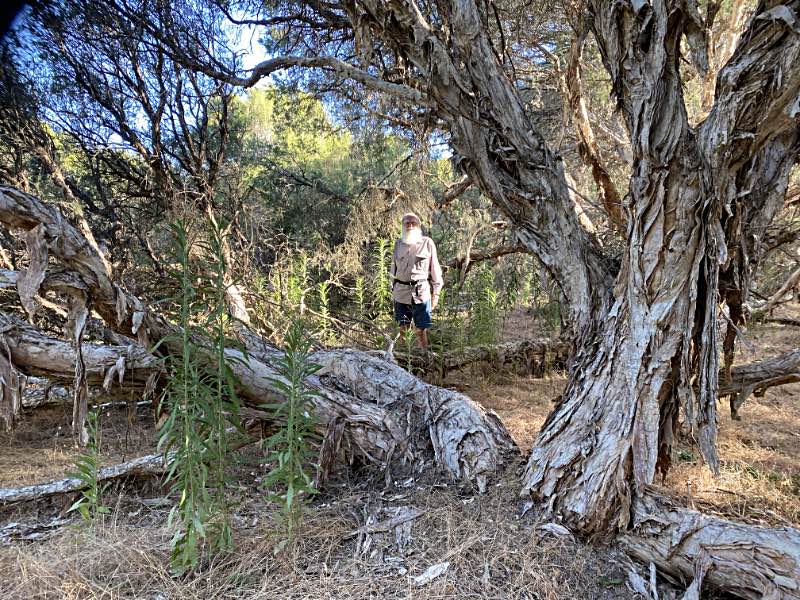Introduction
I will say, at the beginning, that I am finding my life increasingly burdonsom (for several of the reasons given below) and at some time, of my own choosing, in the future I am intending to end my life.
|
No one else, no society, no religious group, no government, has any right to interfere in that decision. Whether or not a 'terminal illness' is involved is irrelevant; we are all going to die, it's just a matter of time.
Before ending his (or her) own life, however, the person has to consider the impact of his decision on those who are dear to him, and to whom he may be dear, and any who may be dependent upon him (children, spouse).
The relevant questions he must ask are:
- Am I enjoying life?
- If not, is that a temporary condition? Depression? Will the condition improve with time?
- Am I a net asset to, or burden on, society and those around me?
- What impact would my suicide have on my family? Can I prepare them for that?
One of the milestones in the development of an intelligent species must surely be when the individuals of that species realise and accept that they can choose the time of their own death and the method for bringing it about. The alternative, leaving one's death to 'natural causes', seems to me absurd.
|
|
Why might a rational person decide to end his or her life?
|
- Advancing age with declining physical and/or mental health including:
- Worsening memory;
- Increasing difficulty in bringing to mind the words I need;
- Becoming more easily confused;
- Increasing difficulty in problem solving;
- Increasing frequency of making errors;
- Increasingly problematic bodily functions including, but not only, worsening eyesight and hearing;
- Increasingly consistent or intense pain in an increasing number of bodily parts;
- Disillusionment with one's fellow Man, and disgust for many of them:
- For the greedy, who have far more than most and far more than they need but can never have enough;
Then there are the uplifting people
Of course there are the heroes who provide great examples of how good humans can be. I've listed a very few on another page on this site.The pleasure one gets from reading about such people, and seeing examples of good people on a smaller scale closer to home, can go a long way to restoring one's faith in human nature.
- Disillusionment due to all those who cannot see that we should not only protect our environment, we should always put if first. Without our environment we have nothing;
- Disillusionment with the great majority, for their apathy, selfishness, short-sightedness (it is, of course, the common people who vote the government into power), and for putting their selfish interests before the good of the planet;
- For the general neglect and lack of caring by the great majority about the obvious unsustainability of our current way of life.
- For powerful people, like Gina Rinehart, Angus Taylor, Clive Palmer and Rupert Murdoch who use their power for evil;
- For government, which is often dominated by people who seem to have no ethical standards (for example, the Morrison government of Australia);
- Disgust with so many of the world's leaders, who just want power at any cost (Xi Jinping of China and Vladimir Putin are classic examples);
- Disgust for those who willingly do the bidding of the tyrants; the police who beat, jail and torture peaceful protesters, the judges who condemn innocent people;
- Disgust for the hangers-on of the dictators and tyrants. People like Vladimir Putin could not remain in power if not for all those who support him because they see it as being to their personal advantage, while the majority suffer;
- Disgust for the political hacks; those who support the government's actions simply because of 'party loyalty', with no consideration for right or wrong;
- Disappointment in all those who spend their time on pointless pastimes when with very little effort they could be doing good;
Wind turbine and flowering canola While I can feel that I have some value to my society, by debunking the lies about wind power, working for action on climate change, pressing for ethical government, cleaning up rubbish in the environment, working on the Gleeson Wetlands, revegetating Crystal Brook's Central Park, and fighting delusions such as religion and divination, I will feel that my life has some purpose and my existence justified, but once I can no longer do these things I will not want to go on living as a burden on others.
While I can feel that I have some value to my society, by debunking the lies about wind power, working for action on climate change, pressing for ethical government, cleaning up rubbish in the environment, working on the Gleeson Wetlands, revegetating Crystal Brook's Central Park, and fighting delusions such as religion and divination, I will feel that my life has some purpose and my existence justified, but once I can no longer do these things I will not want to go on living as a burden on others. - For the greedy, who have far more than most and far more than they need but can never have enough;
- Frustration:
- At trying to make the world a better place but finding little company in that endeavour;
- At the many stupid people (or are most of them dishonest rather than stupid?) who either don't believe that anthropogenic climate change is happening or that it is a serious problem;
- At seeing millions of people who morn the war-dead yet do nothing to try to stop future wars;
- At seeing well meaning people waste their time on causes that are trivial and even foolish rather than on one or more of the many very urgent and important causes that they could work on (an example of a foolish cause, opposing the proposed low-medium level radioactive waste repository in South Australia);
- At the billions of people who accept the religion delusion (or other delusions and superstitions), in the total lack of any supporting evidence, and in a world in which rational and responsible action is increasingly needed;
- At the lack of critical thinking, and consequent belief of falsehoods, in so many of my fellow human beings;
- I wouldn't want to go on living if I become a burden on society and can no longer contribute meaningfully to the community in which I live. (I do, or have done, voluntary work in the Clare Gleeson Wetlands, revegetating the 'Central Park' in Crystal Brook, at Bowman Park near Crystal Brook, weeding public spaces, picking up roadside rubbish, etc.)
|
|
Why should one not suicide?
Peter Saul wrote a piece titled Do people really have the right to a rational suicide? for The Conversation, 2014/07/28. While not condemning rational suicide he was disapproving in his tone. Yet he gave no justification for his apparent opposition. I found his article unconvincing, less well thought out than most on The Conversation.He at one point writes "your right to die becomes my obligation to kill". This is not only illogical, it is simply false. No one is proposing that anyone will be obliged to assist in a death against their will; there will be no 'obligation to kill'.
I intend to kill myself at a time of my choosing.
I have no difficulty in justifying that decision.
|
No one will be harmed by my death. In fact it could be argued that I will be doing a good deed by my suicide:
- The state pays my superannuation. I will be saving the taxpayers a financial burden;
- The world is grossly overpopulated. One less person will ease the load on the planet;
- My investments and possessions will pass to others - to their advantage.
|
|
|
The option of suicide removes the fear of dying
The knowledge that one can end one’s life when one chooses means that there is no need to worry about a possible long, painful and miserable death. You can enjoy life as long as life is enjoyable and dispense with it when and if it becomes miserable.
At the time of writing this section I was 77 years old and my body was gradually failing. The knowledge that I can end my life when I find that life is more a burden than a pleasure, and when I feel I have become more a burden to society than of value to society, is a comfort to me.
What alternatives to suicide does an old person have?
If an old person, such as myself, is facing declining health and fitness, increasing problems with bodily functions and increasing pain he/she will find life more and more burdensome. As the situation progresses he must expect to at some time not be able to look after himself. He must expect to eventually no longer be able to contribute to the society in which he lives, instead he must expect to become a burden on that society. He will also find life less enjoyable.What choices does he have?
- go into an aged care home;
- get help to live at home;
- or end his life.
For myself I would prefer the third alternative.
Methods of suicide
Hanging is one of the most common ways that people suicide. It would be a terrible way of dying. Some people shoot themselves and leave the very unpleasant job of cleaning up the mess to others; and it is possible to botch the job and make yourself seriously mentally damaged rather than dead.There are painless, sure, clean and gentle ways of ending one's own life. Exit International provides support and information for those wanting to end their lives. I have great respect for Doctor Philip Nitschke and the organisation he created, Exit International.
Suicide for old people in sound mental health should be not only accepted, but encouraged and assisted, if it is what they want.
I have the means to end my life gently, painlessly, and cleanly. I learned about it from Exit International.
